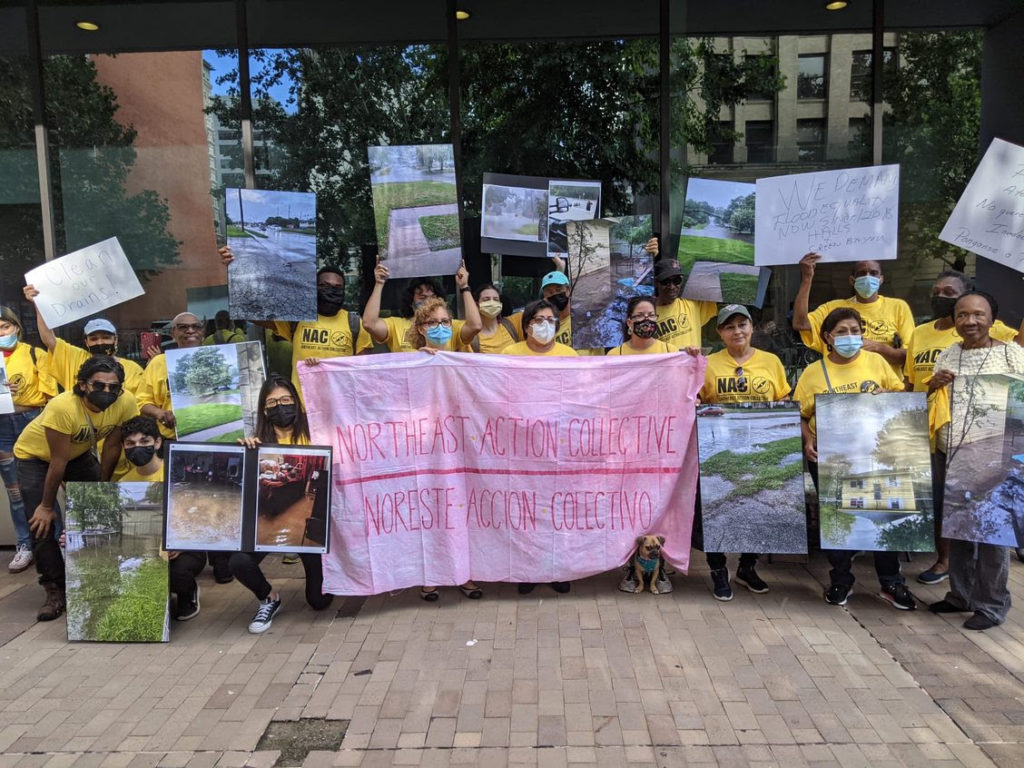Accelerate communities’ recovery from natural disasters and improve disaster resilience
Lesson Learned:
Combining direct services with policy advocacy strengthens communities in the short-term and long-term.
As natural disasters become more frequent, communities often face the impact of another disaster before fully recovering from the previous one, leaving them more vulnerable to adverse financial and health outcomes.[1]
In the United States, repeated natural disasters have disproportionately impacted low-income communities in areas like Northeast Houston, Texas, where storm frequency and disinvestment mean many homes are often in disrepair, even before a disaster hits (learn more by visiting CHIP’s disaster relief guidance).[2]
West Street Recovery provides direct support to help people recover from a disaster while advocating for systemic changes that make the area more resilient to future disasters.
“In my neighborhood East Sunnyside, there’s a lot of seniors with no central air or central heat. I was able to give them heaters and water, and it felt good to be in a position to lend a helping hand. I met some who had broken pipes and we were able to get them fixed too.”
– Neandra Boyd, a resident and volunteer from East Sunnyside
“These folk are doing a great service for the community while showing us how to BE the change we want to see!”
– Joyce, community member

What it does
Founded after Hurricane Harvey in 2017, West Street Recovery (WSR) began as a collective of volunteers providing immediate relief to storm-ravaged Northeast Houston neighborhoods that larger aid organizations were slow to reach.
To help resolve long-term problems, the organization now combines immediate relief with grassroots organizing.
WSR provides those who can’t afford home repairs with funding and expertise in disaster resilience construction, like freeze-resistant piping, elevating outlets, and installing tile flooring that won’t mold.
WSR trains community members to complete repairs and build skills that will be useful in future recovery efforts. For more specialized tasks, the organization contracts firms owned by Northeast Houston residents, often survivors of disasters themselves, to ensure that recovery efforts economically benefit those most affected by disasters.
To increase preparedness, WSR distributes supplies for households to have in case of emergency. They also distribute generators and have recently created a “hub house system” that equips neighborhood leaders with solar panels and batteries, rescue equipment, and basic medical supplies to distribute to their communities in the immediate aftermath of a disaster.
WSR is committed to ensuring that those most affected by disasters, often marginalized communities, are not just recipients of aid but active participants in shaping solutions. WSR’s work has built relationships with community members, leading over 400 volunteers to work with the organization on advocacy. The organization has formed the Northeast Action Collective (NAC), a grassroots group that has led campaigns to increase the city’s drainage spending by millions of dollars to reduce the risk of flooding.
WSR also publishes reports on topics like barriers to disaster recovery from the perspective of residents of Northeast Houston, strategies to improve disaster resilience, and the danger of flooding from natural disasters and every day rain events in Northeast Houston.
How effective it is
West Street Recovery (WSR) has repaired over 350 homes, providing critical support to families severely affected by disasters. Following Hurricane Harvey, WSR repaired 28 homes from the studs up, ensuring that these structures were restored and better equipped to withstand future disasters.
In 2023 alone, WSR invested $400,000 into the local housing stock, benefiting 50 homes and restoring water access to 32 families who did not have insurance or were not eligible for government aid. In 2024, WSR completed over $700,000 of work, replaced over 25 roofs, and helped over 150 families apply for FEMA aid and insurance.
WSR’s advocacy work has also secured significant policy wins, including winning $28 million between 2023 and 2024 in the city’s budget for drainage improvements and the reversal of a 22 -year-old ordinance that had perpetuated unequal infrastructure provision in Northeast Houston.
How philanthropy helps
WSR relies entirely on philanthropic support to sustain its operations. Additional philanthropic support will enable WSR to expand its advocacy work, repair more homes, and improve disaster resiliency in Northeast Houston. Learn more: https://www.weststreetrecovery.org/
More ways to help
Build Up Nepal works with local entrepreneurs in rural Nepal to rebuild safe, affordable, and eco-friendly housing in the wake of multiple disasters.
For strategies on disaster relief and preparedness and more organizations working in this space, see CHIP’s Disaster and Humanitarian Relief guidance.
Notes
[1] FEMA. (2024, March 21). Disaster Declarations for States and Counties | FEMA.gov. https://www.fema.gov/data-visualization/disaster-declarations-states-and-counties
[2] de Ruiter, M. C., Couasnon, A., van den Homberg, M. J. C., Daniell, J. E., Gill, J. C., & Ward, P. J. (2020). Why We Can No Longer Ignore Consecutive Disasters. Earth’s Future, 8(3), e2019EF001425. https://doi.org/10.1029/2019EF001425
